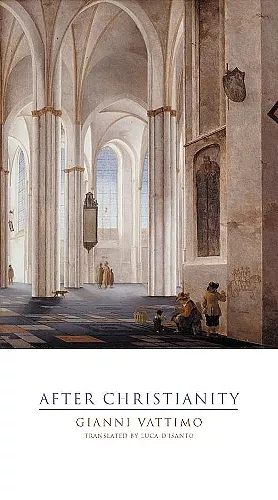After Christianity
Gianni Vattimo author Luca D'Isanto translator
Format:Hardback
Publisher:Columbia University Press
Published:19th Aug '02
Currently unavailable, and unfortunately no date known when it will be back

What has been the fate of Christianity since Nietzsche's famous announcement of the "death of God"? What is the possibility of religion, specifically Christianity, thriving in our postmodern era? In this provocative new book, Gianni Vattimo, leading Italian philosopher, politician, and framer of the European constitution, addresses these critical questions. His compelling arguments about secularization as the fulfillment of the Christian message, Nietzsche's thesis as concerning only the "moral god", the postmodern condition in light of Joachim of Fiore's thesis concerning the "Spiritual Age" of history, and the relativity of the "real", pave the way for religion and God to become a serious topic for philosophy again.
What has been the fate of Christianity since Nietzsche's famous announcement of the "death of God"? What is the possibility of religion, specifically Christianity, thriving in our postmodern era? This book addresses these questions.What has been the fate of Christianity since Nietzsche's famous announcement of the "death of God"? What is the possibility of religion, specifically Christianity, thriving in our postmodern era? In this provocative new book, Gianni Vattimo, leading Italian philosopher, politician, and framer of the European constitution, addresses these critical questions. When Vattimo was asked by a former teacher if he still believed in God, his reply was, "Well, I believe that I believe." This paradoxical declaration of faith serves as the foundation for a brilliant exposition on Christianity in the new millennium-an age characterized by a deep uncertainty of opinion-and a personal account of how Vattimo himself recovered his faith through Nietzsche and Heidegger. He first argues that secularization is in fact the fulfillment of the central Christian message, and prepares us for a new mode of Christianity. He then explains that Nietzsche's thesis concerns only the "moral god" and leaves room for the emergence of "new gods." Third, Vattimo claims that the postmodern condition of fragmentation, anti-Eurocentrism, and postcolonialism can be usefully understood in light of Joachim of Fiore's thesis concerning the "Spiritual Age" of history. Finally, Vattimo argues for the idea of "weak thought." Because philosophy in the postmetaphysical age can only acknowledge that "all is interpretation," that the "real" is always relative and not the hard and fast "truth" we once thought it to be, contemporary thought must recognize itself and its claims as "weak" as opposed to "strong" foundationalist claims of the metaphysical past. Vattimo concludes that these factors make it possible for religion and God to become a serious topic for philosophy again, and that philosophy should now formally engage religion.
This volume presents a philosophical inquiry as well as a personal account of the way in whcih the author recovered his faith through the works of Nietzsche and Heidegger. Journal of Contemporary Religion Vattimo can certainly sling it with the best of his fellow European philosophes. San Francisco Bay Guardian In this remarkable book, Gianni Vattimo engages in an unyielding analysis of the state of life in the West after Christianity. -- W. David Hall Journal of Religion
ISBN: 9780231106283
Dimensions: unknown
Weight: unknown
128 pages